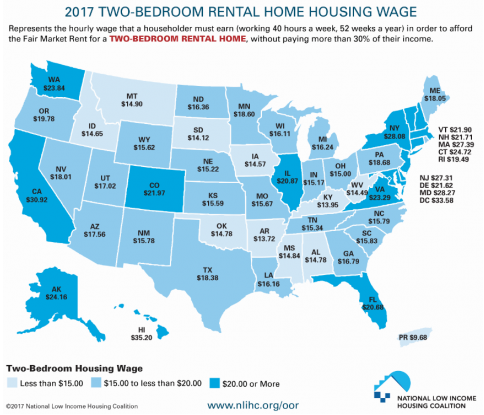
The minimum hourly wage required to afford rent on a two-bedroom apartment, of course, depends on where you live — ranging from a low of $11.46 in some counties in Georgia to a high of $58.04 in the San Francisco Bay Area.
The most expensive state for housing is Hawaii, where workers would need to make $35.20 an hour to afford a two-bedroom apartment. They would need to make $33.58 in the District of Columbia, $30.92 in California, $28.27 in Maryland, and $28.08 in New York.
In the District, where the hourly minimum wage is $12.50, a household — say a single parent — must earn $69,840 a year to be able to afford the fair market rent of $1,746 a month for a two-bedroom apartment.
Many of the occupations projected to add the most jobs by 2024 pay too little to cover rent. These are customer service representatives, personal care aides, nursing assistants, home health aides, retail salespeople, home health and food service workers who make, on average, between $10 and $16 an hour.
Those whose earnings put them below the federal poverty level cannot even afford the average cost of a one-bedroom apartment in any state. The national average rent is $892 a month for a modest one-bedroom apartment and $1,103 for a two-bedroom.
As a result, more than 11.2 million families end up spending more than half their paychecks on housing, the report said — a trade-off with other basic needs like food, transportation and medical care.
The picture is not expected to improve in the near future as the rental market remains strong and vacancy rates decline. A record 43.3 million households were renters in 2016, a 27 percent increase since 2006, the report said.
Household income, meanwhile, has not kept up with the pace of rent increases. Between the 2007 housing crisis and 2015, the average rent in the U.S. rose by 6 percent, after adjusting for inflation, while the average household income declined by 4 percent, according to the report, which analyzed Census Bureau data.
U.S. Rep. Keith Ellison (D-MN), in a conference call with reporters Thursday, called the disparity between wages and rent in the wealthiest country in the world “unconscionable.” The lack of affordable housing has long-term consequences for families, he said, making it difficult for children to stay healthy and do well in school.
The report comes at a time when programs for low-income Americans, including subsidized housing, are increasingly under threat.
The current level of public subsidies is already not enough to meet the needs of low-income families, with only one in four eligible households able to receive assistance, the report said. Federal funding for housing assistance programs has declined by 3 percent between 2010 and 2017, the report said.
President Trump, in his budget plan for the 2018 fiscal year, recently proposed $6.2 billion in cuts to the Department of Housing and Urban Development, the most dramatic reduction to the agency since President Ronald Reagan slashed its funding by 50 percent in the early 1980s. Trump’s proposal would gut federal funding for affordable housing, along with other programs designed to serve the poor.